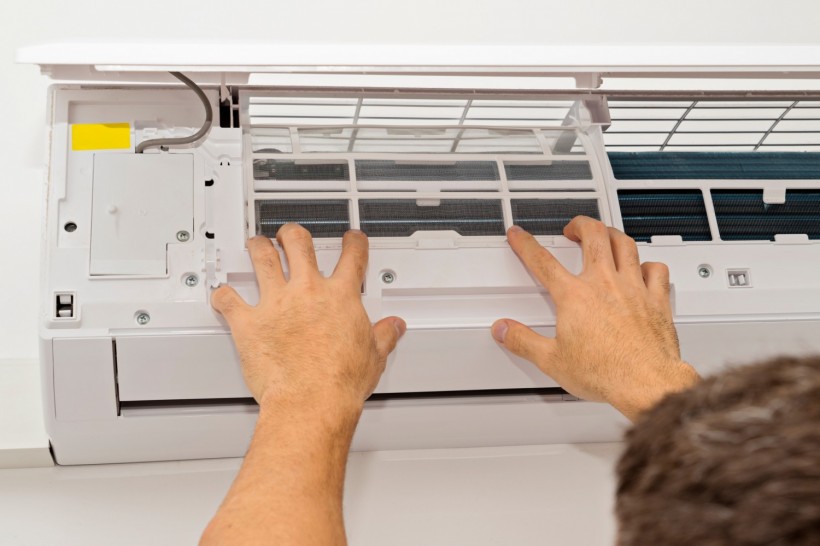
(Photo : The Importance of Changing HVAC Air Filters Regularly)
A home HVAC system's air filter is one of its simplest components, but it's also one of the most essential. They protect residents' health, extend the longevity of heating and cooling equipment, and increase modern HVAC systems' efficiency. The good news is, changing filters is so easy that homeowners can take care of this routine maintenance task themselves without hiring a professional. First, though, read on to find out about the importance of staying on top of this routine task.
How Often to Change Air Filters?
Experts recommend changing HVAC air filters at least once every month or two. Every household has different needs, and they tend to change throughout the year. If one or more residents suffer from seasonal allergies and the pollen counts are high, more frequent filter changes may be required. Alternatively, if the weather is mild and the need for heat or air conditioning is next to nothing, homeowners may be able to get away with changing out their filters just once a season.
Have trouble remembering to change the filters according to schedule? Don't wait until a maintenance technician comes in and expresses shock at how dirty the filter has gotten. Homeowners can sign up for purchase reminders over at Filter King that make remembering to order and install new filters a breeze.
The Importance of Keeping Filters Clean
Modern HVAC systems are designed to filter 100% of the air that enters into homes' active living spaces. As the filter catches airborne contaminants like dust, dander, and mold spores, those particulates start to build up, making it harder for air to pass through readily and increasing the chances that some particles will be pushed through and spread throughout the home.
Letting airborne contaminants continue to accumulate once the filter is already clogged can lead to all kinds of problems. Homeowners who fail to change their filters can expect:
Lower Air Quality
There are three reasons that dirty filters lead to lower air quality. First, as particulates build-up, it becomes more likely that some of them will be pushed through the mesh of the filter. That's not the most significant source of additional airborne contaminants, though. Most of the problem comes from the inability of air to circulate through the HVAC system.
When air can't circulate quickly, dust, pollen, and other particulates settle on floors and other surfaces when normally they would be pulled through, caught, and eliminated with each filter cleaning. Homeowners wind up having to spend more time dusting and scheduling more frequent dust cleanings to keep their houses from becoming visibly dirty.
The last underlying factor that contributes to lower air quality has to do with the filter itself. As more material builds up on it, that creates a space for moisture to gather in the dark, which encourages the growth of mold and bacteria. These harmful substances can grow on the wrong side of the filter and escape into the home's air ducts, where they can travel throughout the family's living spaces.
Lower Efficiency Rates from HVAC Equipment
The HVAC system's blower fan will have to work overtime to push air through a clogged filter. It will draw more energy to do so, leading to efficiency losses and high monthly bills. To make matters even worse, that inefficiency will eventually impact the system's ability to move air to all areas of the home.
When an HVAC unit isn't operating efficiently, some rooms in the home may not ever reach the temperature set on the thermostat. As a result, the system will operate continuously instead of shutting down when the rooms reach a comfortable temperature, placing even more strain on blower fan motors and other essential components and leaving homeowners dealing with sky-high energy bills.
Shorter System Lifespan
HVAC equipment that can't operate at full efficiency or has to run continuously to compensate for dirty filters won't last as long. Typical HVAC systems last 15 to 20 years, but environmental concerns like those described above can take their toll, leading systems to fail much earlier. Homeowners may be able to have blower fans and other key components impacted by dirty filters replaced, but that costs a lot more than just changing out the air filters on time.
Signs It's Time to Change an HVAC Filter Immediately
Experts may recommend changing filters every month or two, but that's just a guideline. Some homeowners can get away with changing them out only once per season, while others go through multiple filters per month. No matter what schedule they're on, homeowners should never ignore these signs:
- An uptick in residents' allergy symptoms
- Dust collecting near the air vents
- HVAC unit overheating
- Unexplained spikes in heating and cooling bills
Recommendations from HVAC technicians
When in doubt, head to the basement or crawlspace and take a look at the filter. If it's visibly dirty, it's definitely time to place an order for a new one. Even high-quality air filters are inexpensive compared to the repairs and premature system replacements homeowners will be left facing if they don't take action quickly.
How to Change the Air Filter
Changing air filters is a very simple task. Start by checking the HVAC unit to identify what type of filter it uses. Most filters come in one of these standard sizes:
- 16x25x1"
- 20x24x1"
- 16x20x1"
- 20x20x1"
- 14x20x1"
- 20x25x1"
If the filter is a different size, homeowners may need to purchase specialty products. Otherwise, just note that there's no need to buy the same brand. As long as the new filters are correctly sized, they should work fine. Remove the old one and dispose of it, then install the new one in its place. There should be no need for tools or equipment and the filters should slide in and out easily.
The Bottom Line
Changing air filters is a simple task, but it can make a huge difference when it comes to air quality, system longevity, and household expenses. The best way to keep on top of this essential maintenance task is to set reminders for every month the system is in operation.
* This is a contributed article and this content does not necessarily represent the views of hngn.com








